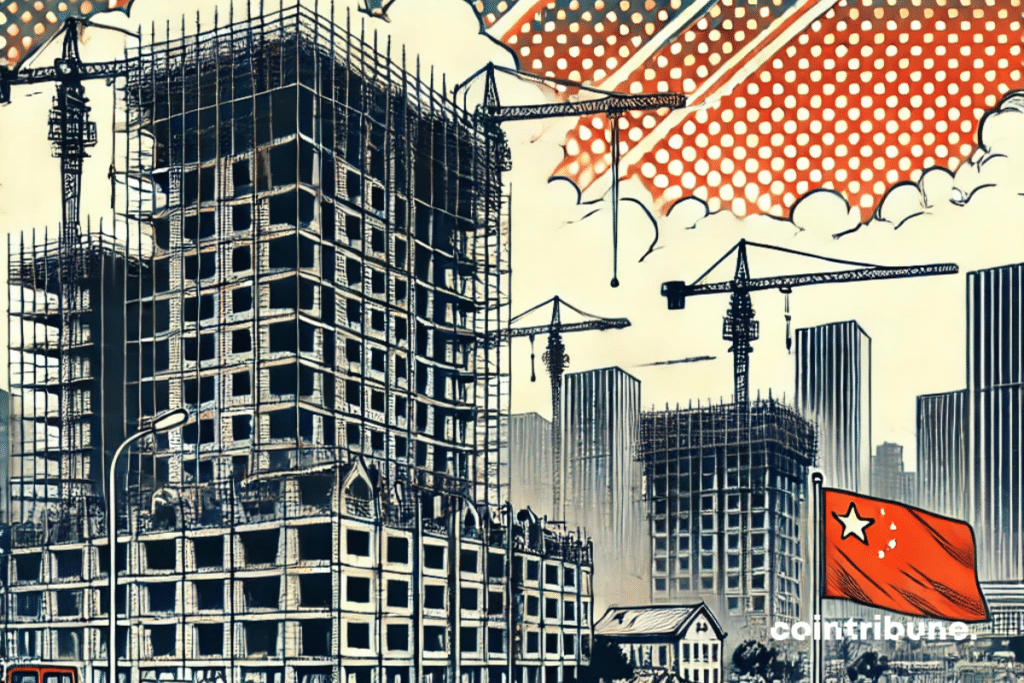Can Beijing Really Prevent The Collapse Of Its Real Estate Market?
In a global context marked by economic uncertainties, China is facing unprecedented challenges to maintain its growth. Indeed, for several months, the Asian giant, the world’s second-largest economy, has been trying to break free from a deadlock, notably through the revival of a real estate sector in deep crisis. The Chinese government has just announced a new series of ambitious measures to stimulate its economy, with particular focus on the real estate market. These initiatives are crucial for China, but also for the global economy, given the Middle Kingdom’s impact on trade exchanges and financial stability.

A Recovery Focused on the Real Estate Sector
China unveiled new measures to support a declining real estate sector, in the hope of boosting a slowing economy. During a press conference held in Beijing, Housing Minister Ni Hong announced the extension of credit for white-listed real estate projects to 4,000 billion yuan by the end of 2024, nearly double the previous allocation. This “white list” mechanism allows municipalities to recommend priority real estate projects to banks for financing. Such initiatives aim to prevent unfinished projects, a recurring problem since the crisis of sector giants like Evergrande.
In addition to this massive funding, Beijing has promised the renovation of one million dilapidated homes located in urban villages. The government believes these renovations are essential to improving living conditions and strengthening infrastructure safety. Indeed, “urban villages present numerous safety risks and poor living conditions. People are eager for renovations,” Ni Hong explained during the announcement. Support for the real estate market, one of the pillars of Chinese growth for two decades, is now crucial to stop the spiral of price depreciation and restore investor confidence.
Measures Well Received, But Skepticism Persists
While the government announcements have already sparked renewed interest in financial markets, including a 20% rise in Chinese stock exchanges at the end of September, the new measures unveiled this week have not generated the same enthusiasm. “The further we got in the press conference, the more we saw that markets weren’t really thrilled,” said Stephen Innes of SPI Asset Management. Thus, investors seem to be awaiting more than announcements to be convinced that the Chinese real estate sector can stabilize in the long term.
“The turmoil reigning in China’s real estate sector cannot be resolved with a few speeches and sloppy measures,” added Innes, reflecting a certain caution regarding the actual effectiveness of these new initiatives.
Beyond targeted housing interventions, the Chinese government also presented a comprehensive economic stimulus plan, which includes interest rate cuts for home loans and easing of property purchases in major metropolises. However, these actions, while positive, must be measured against the magnitude of the structural difficulties facing the real estate sector. Investors emphasize that the situation remains fragile, and the impact of these measures could prove limited if consumer confidence does not return quickly. Beijing, aiming for a 5% growth in 2024, must overcome numerous challenges to meet this target.
While the new measures demonstrate the Chinese authorities’ willingness to revive their economy, they also highlight the complexity of the situation. The real estate crisis remains a major obstacle to achieving the growth objectives set by Beijing, and markets do not seem convinced by the current solutions. Therefore, the evolution of China’s growth figures will need to be closely monitored, as they should provide clues about the effectiveness of ongoing reforms.
Maximize your Cointribune experience with our "Read to Earn" program! For every article you read, earn points and access exclusive rewards. Sign up now and start earning benefits.
Diplômé de Sciences Po Toulouse et titulaire d'une certification consultant blockchain délivrée par Alyra, j'ai rejoint l'aventure Cointribune en 2019. Convaincu du potentiel de la blockchain pour transformer de nombreux secteurs de l'économie, j'ai pris l'engagement de sensibiliser et d'informer le grand public sur cet écosystème en constante évolution. Mon objectif est de permettre à chacun de mieux comprendre la blockchain et de saisir les opportunités qu'elle offre. Je m'efforce chaque jour de fournir une analyse objective de l'actualité, de décrypter les tendances du marché, de relayer les dernières innovations technologiques et de mettre en perspective les enjeux économiques et sociétaux de cette révolution en marche.
The views, thoughts, and opinions expressed in this article belong solely to the author, and should not be taken as investment advice. Do your own research before taking any investment decisions.